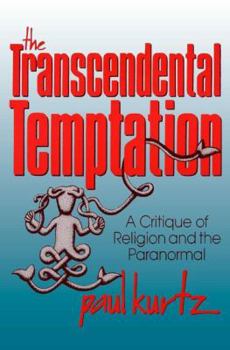The Transcendental Temptation
Select Format
Select Condition 
Book Overview
A landmark work. Mandatory reading for anyone who wants to learn to be a good skeptic.In this widely acclaimed and highly controversial book, Paul Kurtz examines the reasons why people accept supernatural and paranormal belief systems in spite of substantial evidence to the contrary. According to the author, it is because there is within the human species a deeply rooted tendency toward magical thinking - the "transcendental temptation" - which undermines...
Format:Paperback
Language:English
ISBN:0879756454
ISBN13:9780879756451
Release Date:March 1991
Publisher:Prometheus Books
Length:610 Pages
Weight:1.70 lbs.
Dimensions:1.0" x 6.0" x 9.3"
Customer Reviews
6 ratings
Childish
Published by Avalokiteshvara , 2 years ago
Bare-bones and poorly researched. Not at all what I was hoping for.
Questions about Religion and the Psychology of Humans
Published by Thriftbooks.com User , 16 years ago
From back cover: "In this highly acclaimed and controversial book, Paul Kurtz critically analyzes the bases of religion: How provable are the claims of the famous prophets who founded religions in their names: Jesus, Moses, Mohammed, Joseph Smith, Ellen G. White, and others? Do their claims justify religious belief? Finally, is there any evidence that God exists, or that there is life after death? In 'The Transcendental Temptation'..Kurtz attempts to demonstrate that the major monotheistic religions - Christianity, Judaism, and Islam - all rest on myths of revelation. Yet each succeeding generation appears to be impervious to the victories of skepticism over theology in the past or creates new and even more irrational religions. Why is this so? Why are the ancient messages of the prophets as well as the notions of extraterrestrial divinities and demons of the occult still persuasive? Drawing upon extensive research in the paranormal fields - parapsychology, spiritualism, UFOlogy - Kurtz points out the striking similarities between the popular paranormal belief-systems of today and the classical religions of the past. He evaluates the unusual antics of the Fox sisters, D.D. Home, Eusapia Palladino, and other spiritualist in the 19th century as well as the research of J.B. Rhine and S.G. Soal in parapsychology. He finds similar processes at work: on the one hand, fraudulent conjurers posing as prophets or psychics deceiving a gullible public and, on the other, self-deluded individuals acting out their revelatory fantasies. Kurtz attributes the willingness of large sectors of humanity to accept these claims to the proclivity in human nature for 'magical thinking' - which undermines the power of critical judgment and allows many people to accept the occult claims (eg., belief in ghosts, psychics, horoscopes, UFOs) even though there is insufficient evidence in their behalf or strong evidence to the contrary. Given the dee--seated temptation that persists in human culture to accept supernormal phenomena, Kurt asks, what are the prospects for developing a genuinely humanistic society based upon scientific and humane foundations? 'The Transcendental Temptation' is an original and absorbing work that has stirred heated debate."
The Chapter on Islam- Brilliant
Published by Thriftbooks.com User , 20 years ago
Although I find his assessment of Jesus and Christianity lacking, much preferring the two superb books by Randal Helms,Gospel Fictions and Who Wrote the Gospels, the chapter on Islam is worth the price of the book. This chapter on the history of Mohammed and early Islam is fantastic and should be shared with anyone who has a curiosity about the roots of Islam
Excellent appraisal of the temptations of 'faith'
Published by Thriftbooks.com User , 24 years ago
I spent last weekend reading Dr. Kurtz's book, with a very different impression from that of "infaithreborn". Contrary to that reviewer's conclusions below, Kurtz does not focus merely on "fundamentalist" Christians, but on all those who ignore empirical evidence and logic in constructing a supernatural worldview. "Infaithreborn" and others who defend 'nonfundamentalist' Christianity and mysticism should make clearer assertions of what, in fact, they DO believe. Kurtz does not claim that the scientific method has left the world without mysteries, only that it is the best tool we have for dispelling ignorance. In this he joins Carl Sagan and Isaac Asimov, although he is more forthright in his consideration of the possible origins of the Moses and Jesus and Mormon (Joseph Smith) myths. An insightful, courageous contribution to the field of the objective study of religious behavior.
Good But Dense Exploration of the "Need" for Religion
Published by Thriftbooks.com User , 26 years ago
Contrary to what one reviewer (below) has said, ther are no eyewitnesses to Christ. The gospels were all written from 50 to 90 years after the purported death of Christ and St Paul, whose letters are the oldest documents in the NT, likewise did not know Christ and in any event offers little or no detail about the events of the life of Christ.
Very interesting discussion of Skepticism, Science, Religion
Published by Thriftbooks.com User , 26 years ago
It is interesting that although the original edition of this book was written in 1986, much of the discussion on Jesus and the origins of Christianity were recently reinforced by the excellent PBS special titled "From Jesus to Christ: The First Christians" which first appeared April 1998, and in which many notable religious scholars provided material that concurs with that presented in this book. Kurtz draws on numerous historical sources to provide background on the historical Jesus: "In order to evaluate their [the four Gospels] historical accuracy, it is important that we find independent corroboration. Thus we need to examine nonbiblical literature of the first few centuries C.E. I am referring here (1) to any parallels between Christianity and pagan or Jewish presursors; (2) to any secular references by pagan and Jewish authors; (3) to what the early critics of Christianity had to say; and (4) to the extensive apocryphal literature, gospels, and epistles that were subsequently rejected by the church." Kurtz presents the material in a very accessible and well researched manner. An excellent book.






